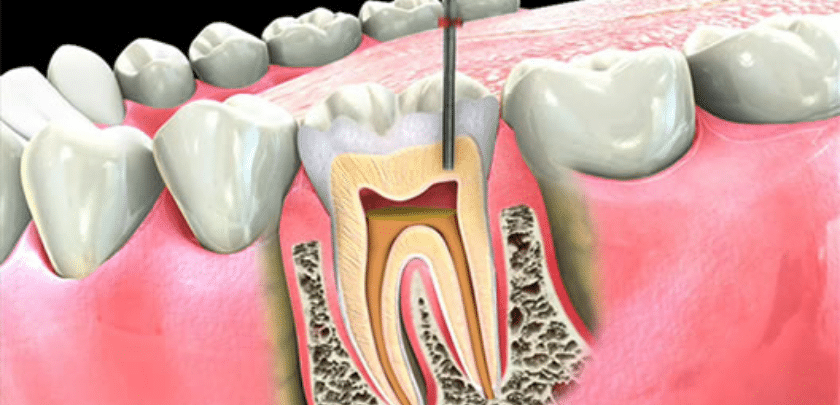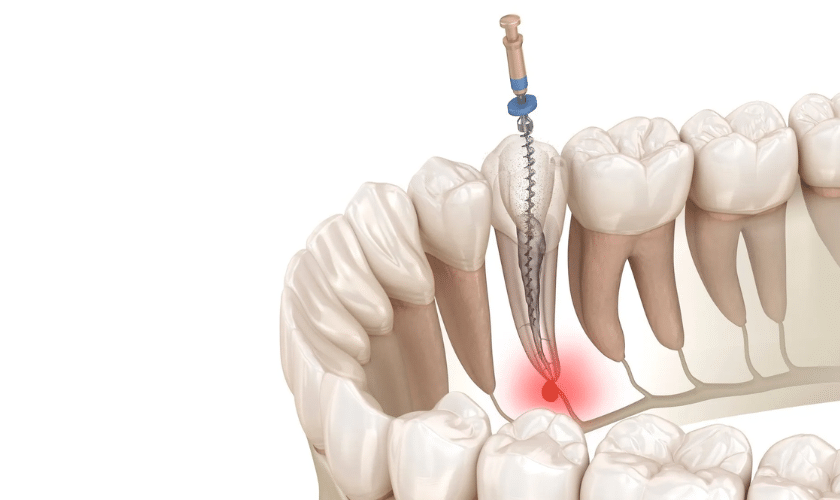
February 13, 2024
Root canals can be a real pain. Literally. If you’ve ever experienced the intense throbbing sensation of an infected root canal, you know just how excruciating it can be. But fear not! In this blog post, we’re going to dive deep into the world of root canal infections and explore everything you need to know about treating them. From understanding the symptoms to exploring treatment options, we’ve got you covered. So grab a seat and get ready to embark on a journey towards healthier teeth and happier smiles!
Understanding Root Canal Infections
When it comes to dental issues, root canal infections are quite common. But what exactly is a root canal infection? Well, it occurs when the pulp inside the tooth becomes infected or inflamed due to bacteria entering through a cavity or crack in the tooth. The pulp, which consists of nerves and blood vessels, can get irritated and cause severe pain.
Root canal infections can happen for various reasons. Poor oral hygiene practices like neglecting regular brushing and flossing can lead to plaque buildup and eventually tooth decay. Additionally, trauma to the tooth from accidents or injuries can also result in an infected root canal.
Identifying whether you have an infected root canal is crucial for timely treatment. Some common symptoms include persistent toothache, sensitivity to hot or cold temperatures, swelling around the affected area, tender gums, bad breath, and even fever in some cases.
However, it’s important not to self-diagnose as these symptoms might overlap with other dental problems as well. Seeking professional help from a dentist is essential for accurate diagnosis and appropriate treatment options.
Symptoms of an Infected Root Canal
Experiencing dental pain? It could be a sign of an infected root canal. This condition occurs when the pulp inside your tooth becomes infected, usually due to deep decay or trauma. Recognizing the symptoms early on is crucial for swift treatment and preventing further complications.
One common symptom of an infected root canal is persistent toothache that worsens with chewing or applying pressure. You may also notice increased sensitivity to hot or cold food and drinks. In some cases, you might even experience swelling in the surrounding gums or face.
Another telltale sign is discoloration of the affected tooth. If you notice a darkening or graying appearance, it may indicate infection within the root canal. Additionally, bad breath and a foul taste in your mouth can be indicators that something isn’t right.
It’s important to note that not all patients will experience these symptoms, especially in the early stages of infection. Some individuals may only have mild discomfort initially, while others might not feel any pain at all until the infection has progressed significantly.
If you suspect you have an infected root canal based on these symptoms, it’s crucial to seek professional help as soon as possible. Only a dentist can properly diagnose and treat this condition through various options such as root canal therapy or extraction if necessary.
Remember, ignoring your symptoms won’t make them go away – it will only lead to more severe oral health issues down the line. So don’t hesitate – schedule an appointment with your dentist today!
Causes of an Infected Root Canal
When it comes to understanding the causes of an infected root canal, there are a few key factors to consider. One of the primary causes is untreated dental decay. If a cavity is left untreated and reaches the innermost part of the tooth, known as the pulp, it can lead to infection.
Another common cause is trauma to the tooth. Whether from an accident or injury, any damage that exposes the pulp can create an entry point for bacteria and infection. Additionally, cracked or fractured teeth can also allow bacteria to invade the root canal system.
Poor oral hygiene practices can contribute to root canal infections as well. Inadequate brushing and flossing habits can lead to a buildup of plaque and tartar, which harbor harmful bacteria that can penetrate deep into the roots.
In some cases, previous dental work such as fillings or crowns may become compromised over time, allowing bacteria to enter the tooth’s interior.
Certain systemic conditions like immune disorders or diabetes can weaken your body’s natural defense mechanisms against infections including those in your root canal area.
It’s important to note that these are just some possible causes; each case is unique and should be evaluated by a dental professional for proper diagnosis and treatment. Remember: prevention through regular dental check-ups and maintaining good oral hygiene practices remains crucial in avoiding potential root canal infections.
Treatment Options for an Infected Root Canal
When it comes to treating an infected root canal, there are a few options available. The specific treatment approach will depend on the severity of the infection and the condition of the tooth.
One common option is root canal therapy. This procedure involves removing the infected pulp from within the tooth and cleaning out any bacteria or debris. The space left by the removed pulp is then filled with a special material to prevent reinfection.
In some cases, a retreatment may be necessary if the initial root canal was not successful in fully eliminating the infection. During a retreatment, your dentist will reopen your tooth and remove any remaining infected tissue before sealing it once again.
In more severe cases where root canal therapy or retreatment is not enough, endodontic surgery may be recommended. This involves accessing the tip of the tooth’s roots to remove any diseased tissue or cysts that are present.
Determining which treatment option is best for you should be left up to a dental professional who can assess your specific situation. They will consider factors such as your overall oral health and whether restoration with a crown or filling is needed after treatment.
Remember, early intervention is key when it comes to an infected root canal. Ignoring symptoms or attempting DIY remedies can lead to further complications down the line. So don’t hesitate to seek professional help as soon as you suspect an issue with your root canal!
The Importance of Seeking Professional Help
When it comes to treating an infected root canal, seeking professional help is of utmost importance. While it may be tempting to try home remedies or ignore the issue altogether, doing so can have serious consequences for your oral health.
A professional dentist who specializes in endodontics has the knowledge and expertise to properly diagnose and treat an infected root canal. They will carefully examine your tooth and use advanced imaging techniques to identify any signs of infection. This allows them to develop a personalized treatment plan that addresses your specific needs.
One key benefit of seeking professional help is that dentists have access to specialized tools and technology that are not available at home. These instruments enable them to thoroughly clean out the infected pulp from inside the tooth, eliminating harmful bacteria and reducing the risk of reinfection.
In addition, dentists can prescribe antibiotics if necessary, helping to control the spread of infection. They can also provide local anesthesia or sedation options for a comfortable and pain-free experience during root canal treatment.
Attempting DIY remedies or ignoring an infected root canal can lead to complications such as persistent pain, abscess formation, damage to surrounding teeth or tissues, and even systemic infections. By seeking professional help early on, you increase your chances of successful treatment outcomes while minimizing potential risks.
Remember, when it comes to your oral health, don’t take any chances – trust a qualified dental professional who can provide expert care for your infected root canal. Your smile deserves nothing less!
Aftercare and Prevention Tips
After undergoing treatment for an infected root canal, it’s important to take proper care of your teeth and gums. Here are some aftercare and prevention tips to help you maintain a healthy mouth:
1. Practice good oral hygiene: Brush your teeth at least twice a day using fluoride toothpaste and floss daily. This will help remove any plaque or bacteria that can lead to further infections.
2. Rinse with saltwater: After the root canal treatment, rinsing your mouth with warm saltwater can help reduce inflammation and promote healing.
3. Avoid chewing on hard foods: To prevent damaging the treated tooth, avoid biting down on hard foods or objects such as ice or pens.
4. Schedule regular dental check-ups: Regular visits to your dentist are crucial for monitoring the health of your teeth and catching any potential issues early on.
5. Maintain a balanced diet: Eating a nutritious diet that is low in sugar can support overall oral health and minimize the risk of future infections.
6. Quit smoking: Smoking not only increases the risk of developing an infected root canal but also hinders healing processes post-treatment. Consider quitting smoking for better oral health outcomes.
An infected root canal is not something to be taken lightly. It can cause severe pain and discomfort, as well as potentially lead to more serious dental issues if left untreated. Understanding the symptoms and causes of an infected root canal is crucial in seeking timely treatment.
While there are temporary remedies available over-the-counter, it is important to remember that these only provide temporary relief and do not address the underlying infection. Seeking professional help from a dentist or endodontist is essential for proper diagnosis and effective treatment.
Treatment options for an infected root canal may include a root canal retreatment or apicoectomy, depending on the severity of the infection. These procedures aim to remove the infected tissue, clean the affected area thoroughly, and seal it off to prevent further contamination.
Aftercare following a root canal procedure includes good oral hygiene practices such as regular brushing and flossing, along with scheduled visits to your dentist for check-ups and cleanings. Prevention tips like maintaining good oral hygiene habits and addressing any dental issues promptly can help reduce the risk of developing future infections.
Remember, your dental health plays a significant role in your overall well-being. Ignoring signs of an infected root canal can have long-lasting consequences. So don’t hesitate – seek professional help at the first sign of trouble! Your smile will thank you later.






